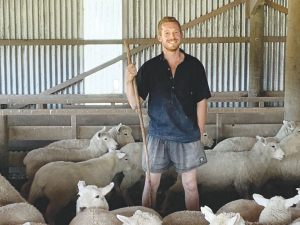EECA funding helps winegrowers adopt solar and battery systems
Winegrowers interested in exploring solar and battery systems on their vineyards could tap into funding and advice through a new funding programme.
 Waipara sheep farmer Tom Kidner says converting some of his farm to an Agrivoltaic solar power station will give him a future-proofed alternative income stream. Photo: Supplied
Waipara sheep farmer Tom Kidner says converting some of his farm to an Agrivoltaic solar power station will give him a future-proofed alternative income stream. Photo: Supplied
A Waipara farmer planning to have 200ha of his property converted to an “Agri-voltaic” solar power plant says it represents a secure, 30-year diverse income stream for his business.
Landowner Tom Kidner says the opportunity to diversify farm income, as well as making a positive contribution to helping the country reach its emissions-reductions targets, are his key motivations.
Kidner told Rural News his farm is known to the locals as being among the driest in North Canterbury and has no possibility of irrigation. But he says a recent Massey University study found the areas between the rows of solar panels produced nearly 40% more grass than areas that received no periodic shading at all.
Kidner says the photovoltaic solar panels will be installed in such a way as to allow him to continue to run 80% of his sheep and lamb business under and between the rows.
“With climate change predicted to make droughts more frequent and intense, having the benefits of shading from the panels could make a really positive difference to the productivity of the whole site,” he says.
The installation will sit close to the Waipara township, stretching about 4km along the north side of State Highway 7 – towards Hanmer Springs and Lewis Pass.
Kidner concedes there may be opposition from people who consider it an eyesore alongside a major tourism route. However, he claims it is just a continuation of changing land use, in a district already transformed by the establishment of many vineyards.
The plan includes extensive tree planting to screen the solar panels from view.
It is being developed by Auckland-based Far North Solar Farm Ltd (FNSF) in partnership with its overseas investors, Aquila Clean Energy Asia Pacific.
Chief executive John Telfer says stakeholder and community consultation is underway and technical studies to assess the viability of the agri-voltaic solar farm model will also be completed.
FNSF says it has “a pipeline” of 1.4 GWp of solar assets planned throughout the country. These include four at more advanced stages – one at Pukenui in the Far North, two in the Bay of Plenty at Edgecumbe and Waiotahe, and another at Foxton in the Horowhenua.
Kidner’s site was specifically chosen because it is flat and close to the Waipara substation for easy connection to the Transpower network. FNSF calls the farm “a pioneering example of modern sustainable land use in the age of renewable energy generation.”
At 135MWp (peak output in MegaWatts) the 200ha solar farm will generate enough clean electricity to power about 28,000 average homes.
Quoting figures from MBIE, Massey University and others, the company says the Waipara installation will produce around 213 GWh (GigaWatthours) per year.
If this is used to power electric vehicles, it would be the same as removing the annual emissions from nearly 14,000 petrol cars.
Telfer says Agri-voltaics is common overseas and is a great way to provide sustainable dual land use development in agricultural areas, especially those prone to drought as North Canterbury can be.
“While our share of renewables is high by world standards, the fact is New Zealand still burns fossil fuels to account for almost 20% of our electricity needs.”
Former Fonterra executive Alex Turnbull has been appointed CEO to lead all five Yili Oceania Business Division companies in New Zealand.
Fonterra executive René Dedoncker is leaving the co-operative later this year to lead Australian agribusiness Elders.
Alliance Group and the Southland Stags rugby team have joined forces in a partnership that will see the the meat co-operative's farmgate brand feature on players' team kits and replica jerseys.
Fonterra's plan to expand its organic programme to the South Island is being well received by farmers, the co-op says.
Voting has started for the renewal of DairyNZ's milksolids levy.
The most successful catchment groups in NZ are those that have 'a source to sea' approach.

OPINION: Here w go: the election date is set for November 7 and the politicians are out of the gate…
OPINION: ECan data was released a few days ago showing Canterbury farmers have made “giant strides on environmental performance”.